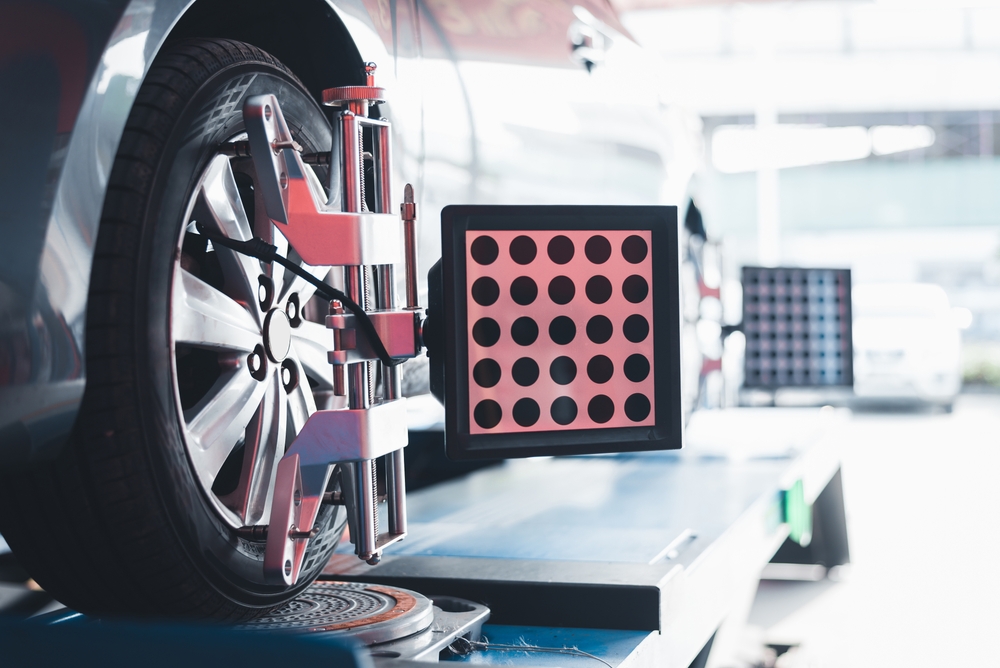The words "balance" and "alignment" aren't just for chiropractors; they're also crucial terms when it comes to car maintenance.
But what do balance and alignment mean in the automotive world? Both are essential for a smooth drive, but they refer to different services. Tire balancing addresses weight imbalances in your tire and wheel assemblies, while alignment adjusts the angles of the tires to ensure optimal contact with the road.
If you're curious about wheel alignment or tire balancing, it's time to expand your knowledge of car care. Learn about the distinctions between the two below.
| Service | Explanation | Indicators | Advantages |
|
Tire Balancing |
Fixes weight distribution on tire and wheel assemblies | Uneven tire wear, vibrations in steering wheel or seat | Smoother drive, less tire wear, less drivetrain stress |
| Wheel Alignment | Adjusts tire angles for optimal road contact | Car pulling to one side, squealing tires, rapid tire wear, crooked steering wheel | Smoother ride, longer tire life |
Tire Balance Explained
Tire balancing, or wheel balancing, corrects uneven weight distribution in the wheels. Imbalanced wheels can lead to issues like vibrations, excessive tire wear, suspension damage, and other complications.
During a tire balancing service, your tires and wheels are placed on a tire balancing machine. The machine spins the tire and wheel assembly, measuring any imbalances. A technician then accurately installs the right tire weights to create a properly balanced wheel and tire assembly. Although wheel balancing and alignment often occur together, they are not the same thing!
How to Know When Your Tires Need Balancing
If you notice uneven tire wear or vibrations in your steering wheel, floorboard, or seat, it could be time for tire balancing. It's also a good idea to balance your tires during a tire rotation, after a flat tire repair, or as part of your scheduled maintenance.
Interestingly, the area of your car that shakes can hint at whether the front or rear wheels need balancing. Steering wheel vibrations typically point to the front tires, while seat vibrations suggest an issue with the rear wheels.
Tires can become unbalanced due to uneven wear or loss of a wheel weight after hitting a curb or pothole. Additionally, tires might develop flat spots and imbalances if your car is parked for extended periods without moving.
Wheel Alignment Explained
Wheel alignment, or tire alignment, involves adjusting a car's suspension—the system connecting a vehicle to its wheels. It does not involve adjusting the tires or wheels themselves.
Alignment prevents your car from drifting to the right or left and can enhance your vehicle's handling and eliminate unusual vibrations while driving.
How to Know When Your Vehicle Needs an Alignment
Your vehicle may require alignment if you notice any of the following:
-
The car pulls to one side of the road
-
Tire treads wear out prematurely or unevenly
-
Tires squeal
-
The steering wheel is off-center while driving
-
The steering wheel vibrates when accelerating
Alignment can be thrown off by car accidents, hitting a pothole, or running into a curb.
What Are the Benefits of Balancing and Alignment
The primary advantage of balancing services is preventing premature tire tread wear. Technicians recommend balancing your tires every 5,000 to 6,000 miles (or as advised by your manufacturer) to prolong their life and enhance performance.
Wheel alignment benefits include better vehicle handling, fuel efficiency, and extended tire life. Our expert Kunes CDJR of Elkhorn Service Center technicians suggest having your vehicle's alignment checked every 6,000 miles or twice a year. Ignoring alignment issues can reduce a tire's lifespan by thousands of miles and damage critical steering and suspension components.
Are you experiencing symptoms of balancing and alignment problems in your car? Don't let them throw you off track. Book an appointment at Kunes CDJR of Elkhorn's Service Center for a serene ride that's both dependable and comfortable.


